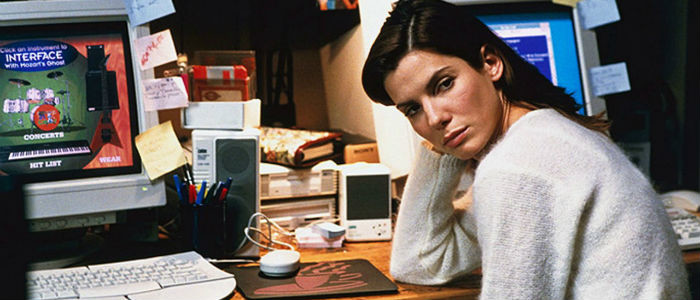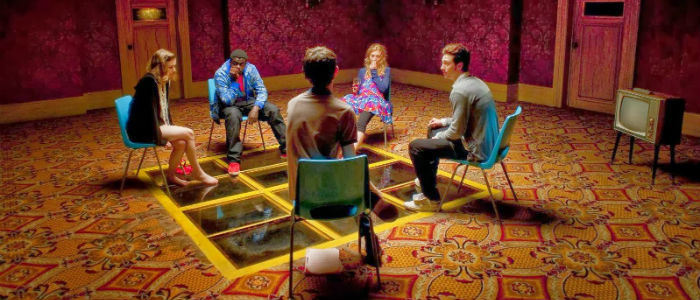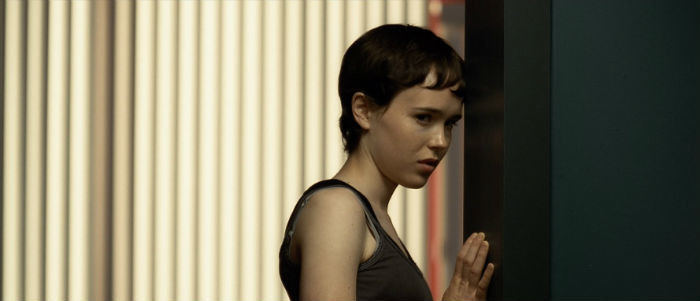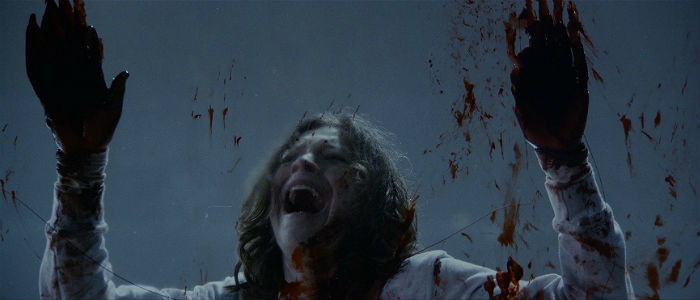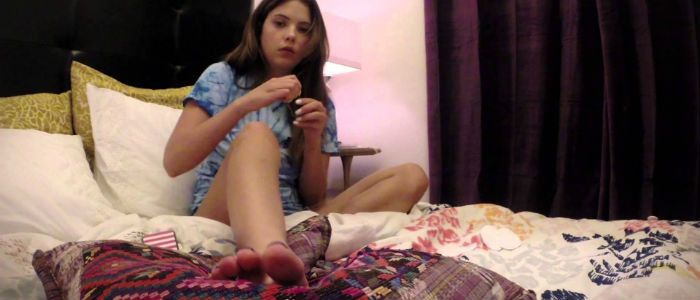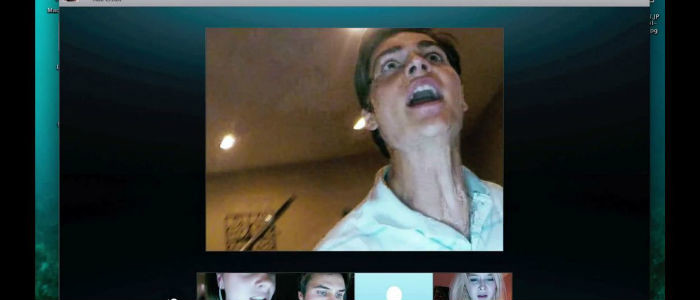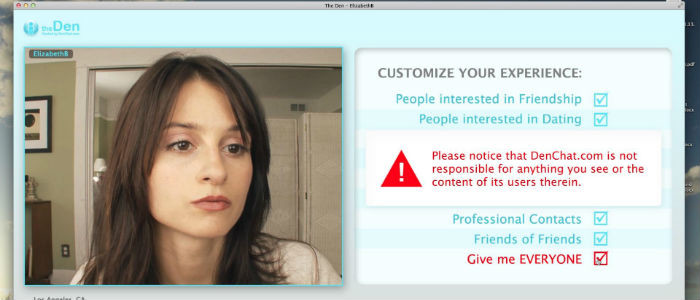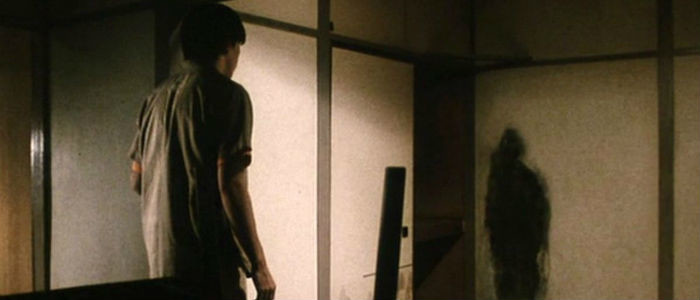8 Terrifying Movies That Prove You Should Stay Off The Internet Forever
This coming weekend sees the release of a new horror movie hoping to scare audiences out of a few bucks, and we're hoping it delivers despite seeming destined to open lower than a certain other horror movie heading into its third weekend. I'm looking at you, Stephen King's IT.
If nothing else, Friend Request stands apart from the old-fashioned thrills of killer clowns and pervy dads by hitching its jump scare-filled wagon to something far trendier. Yes, of course I'm referring to the dangers of social media. The film sees a popular young woman accept a friend request from someone much lower on the social ladder, but when she realizes her faux pas and ends the "friendship," she discovers a demonic presence who isn't too keen on saying goodbye.
The internet has offered an enormous boon to commerce, education, and cowardice, but while it brings users together there's no doubt it's also keeping people apart. The idea of humanity losing touch with the very connections that make us human is frightening enough in the abstract, but over the years, filmmakers have found and focused on very specific nightmares related to our increasingly online existence. The resulting movies haven't all been winners – sorry Smiley and Open Windows – but a few have tapped into universally felt fears easily enhanced and magnified by the global nature and anonymity of the online world.
Keep reading for a look at the eight scariest internet-related horror movies.
8. The Net (1995)
A computer programmer who works remotely and lives an otherwise sheltered life finds herself caught up in a conspiracy involving software, hacking, and murder. Her enemies wipe her existence from official records and falsely identify her as a fugitive, and with no friends, family, or acquaintances to vouch for her, she's forced to fight back with the only weapons she has. Her fingers.
Wait, don't leave! I'm not pretending this Sandra Bullock-headlined thriller is scary in the traditional sense, but the very idea of identity theft/manipulation is terrifying, and this film hits those fears on its way towards more generic thrills. Other movies have made it dumb (Identity Theft) or exciting (Enemy of the State), but The Net – even as dated as it is – makes it a frightening experience both through the ease in which it could occur and in the damage that results. How do you prove who you are when all the official records say otherwise? Things get so dire that she's forced to turn to Dennis Miller for help. Can you imagine? Horrifying. As mentioned above, the film is more than a little dated by this point (as are all films about "current" technology), but the core story and themes resonate beneath the Hollywood cheese. Once upon a time, a person's word was their bond, and after that it became a matter of signatures sealing the deal. But now? Our entire existence can be altered from thousands of miles away with a few clicks of the keyboard. And we can't count on Dennis Miller to help us anymore.
7. Chatroom (2010)
William is a disturbed young man, but after years of hurting himself he's begun channeling his destructive tendencies towards others. He manages it from his computer, where he's set up a chat room and begun to target four other young people. Each of them has their own issues and insecurities, and under the guise of friendship and understanding William manipulates their actions in the real world. His ultimate goal is to bring one of the teens to the point where he himself failed – suicide.
J-horror director Hideo Nakata (Ringu, Dark Water) moved away from the supernatural with this pitch black social thriller that highlights the dangers of online relationships. William (Aaron Taylor-Johnson) is a danger mostly to himself in the real world, but his reach is extended through the internet, allowing him to touch and corrupt others far more fragile. It's a sad reality that there are people interested in hurting others, and the safety net of the internet's mostly anonymous environment means they more often than not get away with it. The film takes the online bully scenario and turns it into a harrowing, suspenseful story about cruelty and depression being countered by kindness and support both for others and ourselves. The chatrooms are presented as real rooms in which the actors converse – in reality they're apart and simply typing, but seeing them interact ups the drama and the stakes.
6. Hard Candy (2005)
A teenage girl in a hoodie. An older man with malicious intent. The two come together after some flirtatious chatting online, but their get together at his home doesn't quite go how he expects.
To be fair, this terrific little thriller is only scary for pedophiles, but statistically speaking that applies to some of you out there, so it counts for this list. Hayley (Ellen Page) knocks Jeff (Patrick Wilson) unconscious, secures him to a table, and tells him she knows what he did last season. She accuses him of murder, rape, and kidnapping – all of which he denies – and says his punishment is castration. What follows is a scene of legitimately visceral terror for nearly one half of the population, but while the film itself chases genre beats, the setup is where the true scares rest. There are bad people online, and they have a knack for finding the innocent, naive, and desperate among us. The idea that someone we love could be lured online and harmed in real life is frightening, especially as the real world is lacking in avenging teenage girls.
5) #Horror (2015)
A group of young girls gather for a sleepover at rich Sophia's extravagant family home, but what should have been a night of popcorn balls, curling irons, and whatever else preteen girls enjoy, instead becomes an evening of terror. Small acts of cruelty spread between them like a contagion, but before the night's out, someone will graduate to murder.
Tara Subkoff's sly commentary on a disaffected generation builds itself into a slasher by its third act, but before then the film takes time to throw punches at upper crust society, a culture that appreciates art only for its financial value, and of course, our addiction to social media. The handful of adults in the film are lost in their own troubled lives, and the lack of attention they pay towards their children has a cyclic effect. The girls have their heads buried in their phones, often using them to bully and insult those sitting directly across from them in the real world. The genre terror starts once the phones are disposed of, but the groundwork has been laid for a group of children so unmoved by the plight of others that their own pleas for help are drowned out in apathy. Cruelty begets cruelty is a common theme in horror, and here it gets played out with a generation that, once upon a time, would have been considered victims without hesitation.
4. Ratter (2015)
A college student enjoying her independence moves into an apartment of her own, but what should have been the beginning of something special instead becomes something terrifying. Someone is stalking Emma (Ashley Benson) through social media and electronic devices, following and watching her every move, and he's growing closer by the minute.
Like our number two pick below, Ratter finds its terror in the very real world of online hacking and good old fashioned male entitlement. The stalker watches her through cameras on her laptop and phone, and while we know not just anyone could do this, we also know that it can be done. Her privacy is no more, but that realization is made worse in that she herself is utterly unaware. Small things start happening, things we know are attributed to the hacker, but she's left confused and angry at the wrong people which in turn isolates her further from those who might be able to help. Much of the film is a steady build-up of cyber intrusions and minor frustrations, but once the stalker gains access to her physical apartment, it becomes a creepy and frightening affair on its way to a brutal conclusion.
3. Unfriended (2014)
A teenager is bullied and harassed after an embarrassing video is released online, and the distraught girl soon kills herself. One year later a group of friends chatting online notice an uninvited user who they're unable to remove. The unknown person begins revealing secrets that fracture the various relationships, and when the friends attempt to leave the chat they're forced by seemingly supernatural forces to remain online. One by one, they fall victim to the mysterious user's demands for transparency and retribution.
As with the films directly above and below, this feature unfolds entirely on a laptop screen as the various friends enter and leave chats and the user browses other pages and apps. It's a smooth experience that may have you reaching for your own mouse once or twice. As is often the case with these movies, the terror comes both from the narrative itself and the underlying themes of bullying, emotional trauma, and reality that teenagers are often selfish jerks. Story-wise, it feels like an updated take on Terror Train or Prom Night as young people wrong someone and are then forced to pay for their actions. While it can't touch the former, it beats the latter for thrills per minute despite the supernatural shenanigans in place of more grounded ones. It's the one that appears to bear the most resemblance to this weekend's Friend Request, both in title and in story, and if the new film can match this one's spookiness, it'll be well worth checking out in theaters.
2. The Den (2013)
A young woman logs into a Chatroulette-like site hoping to talk with strangers and collect data for her thesis project, but what Elizabeth finds instead is an online predator who accesses her laptop and gains remote control of its functions. The intruder spies on her via the webcam, messes with her life by impersonating her via emails and chats, and draws a noose around her friends and family that quickly goes from virtual to deadly real.
The film eases viewers into its online world with both the mundane and the manipulative as others in the chat room angle for sex and play pranks. It's a world of make-believe, and that very nature becomes an issue when Elizabeth tries to convince others that what she's seeing is real. As the action and violence intrudes into her real world, the film grows even more fluid in its presentation – everything we're seeing is on her laptop screen. From chats, emails, webcams, web sites, and more, it all exists on her screen, and while it should make events feel smaller, it instead makes you realize just how much of our lives is captured online. Like Ratter above, the film builds one creepy beat after another until Elizabeth meets her stalker in person, but it doesn't end there. The horror grows in scope, all while still being captured on security cameras and GoPros leading to a real punch of an ending. It's a horror film and therefore designed to scare, and it succeeds both through narrative thrills and by pointing out how vulnerable we can be in a world where data – like our very lives – can be manipulated, stolen, and erased.
1. Pulse (2001)
A steady rash of suicides begins and grows throughout Tokyo as people thought content in their lives begin ending them instead. The common thread between them appears to be images and videos of people alone, in the dark, as if they're contemplating themselves right out of existence.
Kiyoshi Kurosawa's 2001 chiller remains one of the millennium's creepiest, and it's a masterclass in the use of shadow and score. Traditional compositions exist alongside eerie vocals as events on the screen move from unsettling moments towards utterly terrifying set-pieces. Kurosawa avoids cheap jump scares and loud noise cues and instead scares us with unnerving beats that make their presence known slowly before growing increasingly effective before our eyes. The story finds the nightmare in technology — and our increased dependence upon it — and then spills it onto the screen in truly spooky ways from the personal to the apocalyptic. Technology that was meant to draw us closer together is instead pushing us apart, and that gap is being filled by unwelcome guests taking advantage of the abundant sadness and isolation of modern life. It's a dreamily-paced film, but watching it unfold in a room lit only by the television and your laptop is a supremely nerve-wracking experience. If you haven't seen it yet, do so on a night free of distraction. (And be sure to watch the Japanese original, not the US remake.)

